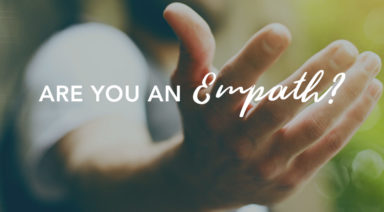How to Weather an Existential Crisis

There comes a time in the lives of many when there is a pause to reflect on the meaning of life. When this moment of Zen turns out to be especially troubling, puzzling, or even discombobulating, we have a name for it — an existential crisis. The symptoms of an existential crisis range from mild wonderment to turning your world on its head and it can feel much more extreme than a prolonged state of confusion or mental health issue.
There are numerous introductions into the potential rabbit hole of an existential crisis, but all of them usually begin with the question “Why am I here?” or “What is the meaning of life?” If you’re going through this, you aren’t alone.
Philosophers have contemplated the purpose of existence and existential anxiety all the way back through our collective past. Socrates had a prescription: “Know thyself.” The Indian sage Ramana Maharshi suggested asking, “Who am I?”
Why do we humans get caught up in this search for meaning, and why do we fear a meaningless life? Better yet, is there any meaning at all? Some people suggest there is a purpose to life that is bound to a sense of well-being, but the masters of enlightenment have long said that we are looking in the wrong direction — outward instead of inward.
Joseph Campbell taught that it’s better to stop searching for the meaning of life and to begin looking for the meaning in life. In other words, life deals us a certain hand of cards, and we need to find what makes us passionate about them. Campbell summed this up in three immortal words: “Follow your bliss” — and the philosopher Soren Kierkegaard said, “Don’t forget to love yourself.”
What is an Existential Crisis?
Psychologists generally define an existential crisis as a moment when you question the foundations of your life — whether life has meaning, purpose, or value. This issue is the topic of the philosophical school of existentialism. Sometimes the crisis comes out of the blue, and other times it bubbles until it rises to the surface. There are a number of possible causes for its arising, including a feeling of loneliness or isolation that even family members cannot help.
The big questions about life that lead to existential angst may be provoked by an event that reminds you of the preciousness of life, a lifelong search for the meaning of life, an occurrence that alters or destroys your sense of reality, a pleasurable or painful experience that impresses itself upon your feeling about life and what it means to be a human being or the depths of meditative practice.
What Can You Do About It?
Searching for how to overcome an existential crisis can be as disturbing as the crisis itself. This is because of the way the sense of self, which Carl Jung called the persona, perceives a meaningful life. Pioneers in psychology and philosophy, as well as mystics such as Jiddu Krishnamurti, have taught that the mind is conditioned since early childhood to identify with the body and all of its relationships.
Thus, the mind as a tool for learning and problem-solving also becomes a mind that is fraught with fear, the unending search for pleasure and ways to avoid pain, and a life purpose.

Krishnamurti called this sense of self “the center,” and in line with other mystics, he too realized that in the bigger picture, this egoic mind is the source of psychological suffering.
It is the sense of self, or what you call “me” or “I” that is so troubled by the trials and tribulations of life. As a byproduct of existential concerns, it may reach an existential crisis then turn upon itself to ask why it exists and what is at its core.
The prescription for an existential crisis is written at a fork in the proverbial road, with one way trying to soothe the troubled mind and get out of this upsetting stage, and the other way continuing down the path to find out who you are. For the latter path, Ramana Maharshi recommended a practice called self-inquiry.
He taught, “Of all the thoughts that arise in the mind, the ‘I’-thought is the first. It is only after the rise of this that the other thoughts arise. It is after the appearance of the first personal pronoun ‘I’ that the second and third personal pronouns [you, he, she, it] appear. Without the first personal pronoun, there will not be the second and third…By the inquiry ‘Who am I?’ The thought ‘Who am I?’ will destroy all other thoughts and, like the stick used for stirring the burning pyre, it will itself, in the end, get destroyed. Then there will arise Self-realization.”
But what if you don’t want to go down this road of self-searching because it’s too upsetting or scary, you’re too filled with negative thoughts, or the timing just isn’t right? In this case, you can tackle your crisis by psychological means.
Find a support group, review life events, look into your own life, seek out a qualified health professional (such as a psychotherapist), find a sense of purpose, read Jean-Paul Sartre, delve into the intricacies of human existence, and explore other avenues to develop a new perspective and to give life meaning.
The Psychological Remedy for an Existential Crisis
An existential crisis can often be accompanied by, or even confused for, depression, especially if accompanied by suicidal thoughts. It’s a blurry line because both represent a focusing inward upon an unsettled mind.
Australian psychologist Amanda White explained, “Angst, personal conflict, loneliness, hopelessness, and despair often make up the bleak and difficult emotional landscape of an existential crisis. Existential depression is a term sometimes used to describe major depressive episodes that stem from an existential crisis.”
She adds that no psychological or medical approach is comparably better able to address one’s crisis. This doesn’t mean that professional help isn’t useful, however, it just means that if you’re looking for a therapist, you have to find the right fit.
Psychological stages of development, wrote White, including existential crises, are about a person’s personal evolution. The mind may be moved to evolve when threatened. “When environmental and internal feedback indicates threat, in which ways of being and coping have become dysfunctional, then the system is challenged to revise its norms and to align with more meaningful goals, values, behaviors, and connections.
Understandably, to the mind, this process of adaptation can be very disorienting. Letting go of the known self may mean grief and loss; it can feel like dying.”
This is commonly referred to as “ego death,” and depending on the degree of attachment and identification to the body and all of its worldly characteristics, experiences, and possessions, the event can be anywhere from stifling to liberating. Thus, when the question arises as to how long an existential crisis lasts, the answer is that it depends upon the individual and how attached he or she is to this life that’s being lived.
Suffering as a Motivator
Paradoxically, the cure for an existential crisis is the same as the cause — suffering. When we suffer, we are driven to change; it’s life’s great motivator. The Dalai Lama explained, “When we meet real tragedy in life, we can react in two ways — either by losing hope and falling into self-destructive habits or by using the challenge to find our inner strength.” Few psychologists would disagree with such Buddhist wisdom. And Viktor Frankl, author of Man’s Search for Meaning, wrote, “If there is meaning in life at all, then there must be meaning in suffering.”
Among the more notable quotes on existential crisis are those that address the concept of a psychological wake-up call and the meaning of life. Joseph Campbell said, “Life has no meaning. Each of us has meaning and we bring it to life. It is a waste to be asking the question when you are the answer.” His prescription was: “If you do follow your bliss you put yourself on a kind of track that has been there all the while, waiting for you, and the life that you ought to be living is the one you are living. Follow your bliss and don’t be afraid, and doors will open where you didn’t know they were going to be.”
Picasso said, “The meaning of life is to find your gift. The purpose of life is to give it away.”
Thomas Merton, the American Trappist monk, said, “Love is our true destiny. We do not find the meaning of life by ourselves alone — we find it with another.”
So what do you do about an existential crisis? You work through it one way or another. You can look past your ego to find what has been present all along, you can give service to others, you can disappear into your work or hobby, you can plunge deeply into religious or contemplative life, or you can meditate your way out of it. The insight revealed through meditation shows that thought, life, and action are beyond your control.
Meditators, especially in the vipassana tradition, have found that life and how you perceive it can be met with awareness. This worldview enlightens you to the nature of all things that lie in the balance. If you can realize that you are a part of this balance and in sync with the universe then you’ll also realize that nothing has happened except for the evolution of thought, while you at your core, apart from the troubling the mind, remain the same.
10 Reasons to Make Inner Peace a Priority

Inner peace is the eternal quest for seekers everywhere. What used to be a rather vague and ephemeral concept has since been backed by modern science as a worthwhile quest towards accessing better health and happiness.
If you’re wary about the real-life importance of making peace of mind a priority, you’re not alone. The monkey mind is a cultural norm and, for most people, daily life consists of a constant stream of chaotic thoughts based in the past or the future.
Rarely do people make the space for presence and the experience of simply being. But when you do, you’ll be astonished how life can shift from tumultuous to serene, from judgemental to accepting. You can find inner peace even in the midst of external chaos.
1. Increased Intelligence
Perhaps one of the most popular benefits that inner peace can bring is the potential to grow your brain, literally. A study done at Harvard University showed that people who practiced mindfulness meditation (quick definition: accepting and paying attention to your thoughts and feelings without judgment) increased the thickness of their prefrontal cortex.
The prefrontal cortex is the part of the brain responsible for regulating emotions, planning, decision making, and regulating social behavior. Just eight weeks of regular meditation practice also shows increased gray matter in MRI scans.
Turns out that seeking peace helps you gain greater intelligence and a stronger, healthier brain.
2. Rewire Your Brain for Positive Feedback Loops
You can change your brain and it’s as easy as being aware of the transience of every experience. Most people go into a fight or flight stress state at least a few times a day, but when peace is your primary pathway you can change that mental habit.
This is because our unconscious thoughts and worries (aka the monkey mind) engage the amygdala, the reptilian part of our brains responsible for keeping us alive in dangerous situations. When the amygdala is engaged we experience anxiety, tension, faster heart rate, and poor digestion, all things modern humans are very familiar with.
When peace is the primary pathway you can consciously comfort your amygdala with the assurance that all is well and the world is NOT ending. Because our brains are plastic and changeable you can change the tendency to activate the amygdala and remain calm even in the midst of chaos.
3. Grow Your Compassion Muscle
The Dalai Lama says that “If you want others to be happy, practice compassion. If you want to be happy, practice compassion.” Yet often we’re too absorbed in our busy lives to experience wholehearted compassion for both ourselves and our fellow humans.
A study published in the journal Psychological Science found that the practice of meditation and the allowing and acceptance that comes along with it increases the internal experience of compassion. Another study showed this affects the brain even when you’re not actively engaged in meditation.




































